Sociological Foundations Assignment: Exploring Social Issues
VerifiedAdded on 2023/01/18
|8
|1838
|30
Essay
AI Summary
This assignment delves into the sociological foundations of racism, examining its various forms and manifestations, including prejudice and discrimination. It explores the role of the Australian Human Rights Commission and the Racial Discrimination Act of 1975 in combating racism. The essay discusses sociological theories such as functionalism, conflict theory, and interactionism, and how they can be applied to understand the root causes of racism and create a stable social environment. The assignment also highlights the significance of ethnicity and the impact of racism on ethnic groups. It suggests various social initiatives, including campaigns and workshops, to promote anti-racism and foster respect for cultural differences, leveraging social media and digital platforms to reach a wider audience and provide support for victims of racism. The conclusion emphasizes that racism is not patriotism and advocates for respecting individual differences to create a diverse and inclusive society.
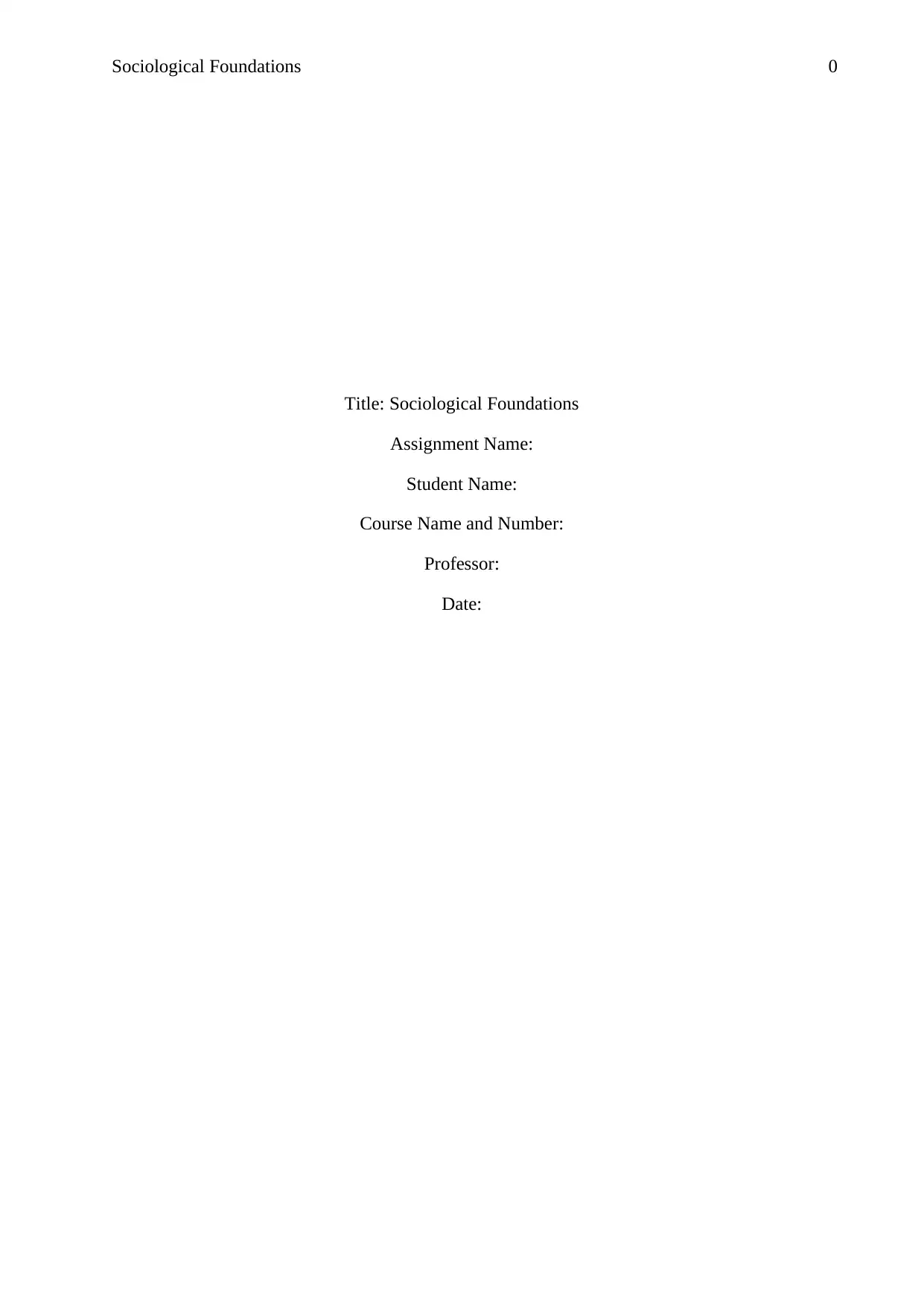
Sociological Foundations 0
Title: Sociological Foundations
Assignment Name:
Student Name:
Course Name and Number:
Professor:
Date:
Title: Sociological Foundations
Assignment Name:
Student Name:
Course Name and Number:
Professor:
Date:
Paraphrase This Document
Need a fresh take? Get an instant paraphrase of this document with our AI Paraphraser
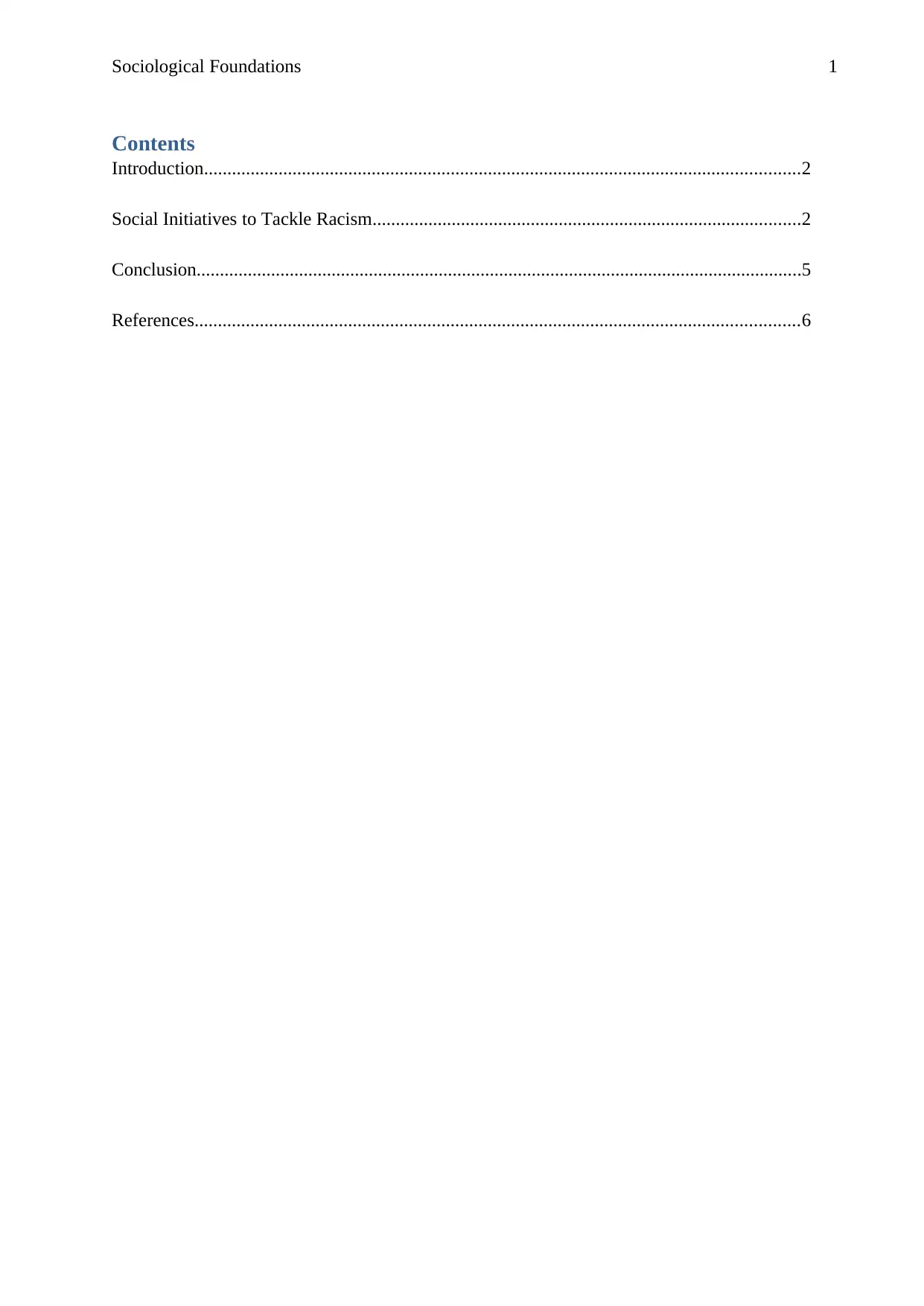
Sociological Foundations 1
Contents
Introduction................................................................................................................................2
Social Initiatives to Tackle Racism............................................................................................2
Conclusion..................................................................................................................................5
References..................................................................................................................................6
Contents
Introduction................................................................................................................................2
Social Initiatives to Tackle Racism............................................................................................2
Conclusion..................................................................................................................................5
References..................................................................................................................................6
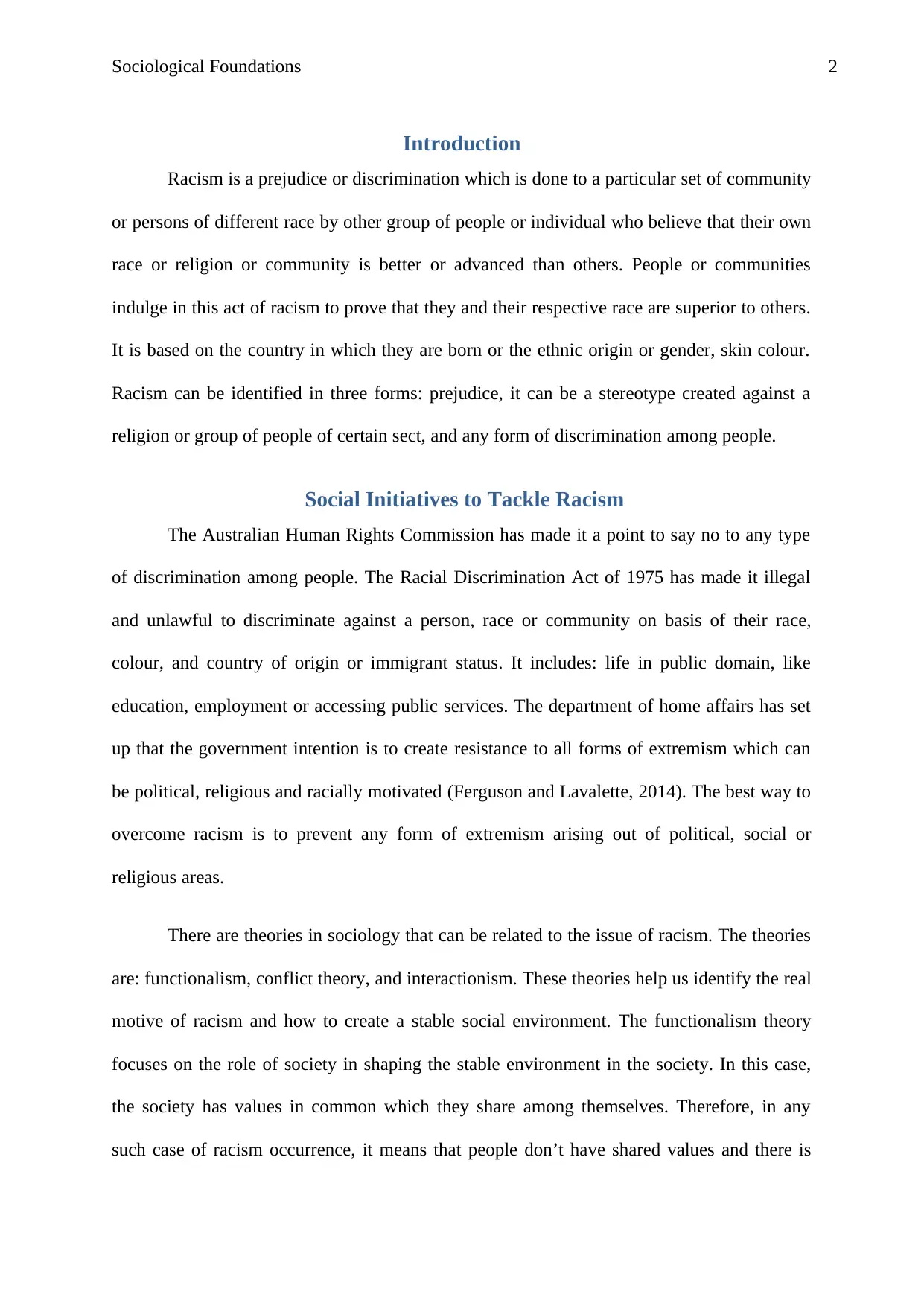
Sociological Foundations 2
Introduction
Racism is a prejudice or discrimination which is done to a particular set of community
or persons of different race by other group of people or individual who believe that their own
race or religion or community is better or advanced than others. People or communities
indulge in this act of racism to prove that they and their respective race are superior to others.
It is based on the country in which they are born or the ethnic origin or gender, skin colour.
Racism can be identified in three forms: prejudice, it can be a stereotype created against a
religion or group of people of certain sect, and any form of discrimination among people.
Social Initiatives to Tackle Racism
The Australian Human Rights Commission has made it a point to say no to any type
of discrimination among people. The Racial Discrimination Act of 1975 has made it illegal
and unlawful to discriminate against a person, race or community on basis of their race,
colour, and country of origin or immigrant status. It includes: life in public domain, like
education, employment or accessing public services. The department of home affairs has set
up that the government intention is to create resistance to all forms of extremism which can
be political, religious and racially motivated (Ferguson and Lavalette, 2014). The best way to
overcome racism is to prevent any form of extremism arising out of political, social or
religious areas.
There are theories in sociology that can be related to the issue of racism. The theories
are: functionalism, conflict theory, and interactionism. These theories help us identify the real
motive of racism and how to create a stable social environment. The functionalism theory
focuses on the role of society in shaping the stable environment in the society. In this case,
the society has values in common which they share among themselves. Therefore, in any
such case of racism occurrence, it means that people don’t have shared values and there is
Introduction
Racism is a prejudice or discrimination which is done to a particular set of community
or persons of different race by other group of people or individual who believe that their own
race or religion or community is better or advanced than others. People or communities
indulge in this act of racism to prove that they and their respective race are superior to others.
It is based on the country in which they are born or the ethnic origin or gender, skin colour.
Racism can be identified in three forms: prejudice, it can be a stereotype created against a
religion or group of people of certain sect, and any form of discrimination among people.
Social Initiatives to Tackle Racism
The Australian Human Rights Commission has made it a point to say no to any type
of discrimination among people. The Racial Discrimination Act of 1975 has made it illegal
and unlawful to discriminate against a person, race or community on basis of their race,
colour, and country of origin or immigrant status. It includes: life in public domain, like
education, employment or accessing public services. The department of home affairs has set
up that the government intention is to create resistance to all forms of extremism which can
be political, religious and racially motivated (Ferguson and Lavalette, 2014). The best way to
overcome racism is to prevent any form of extremism arising out of political, social or
religious areas.
There are theories in sociology that can be related to the issue of racism. The theories
are: functionalism, conflict theory, and interactionism. These theories help us identify the real
motive of racism and how to create a stable social environment. The functionalism theory
focuses on the role of society in shaping the stable environment in the society. In this case,
the society has values in common which they share among themselves. Therefore, in any
such case of racism occurrence, it means that people don’t have shared values and there is
⊘ This is a preview!⊘
Do you want full access?
Subscribe today to unlock all pages.

Trusted by 1+ million students worldwide
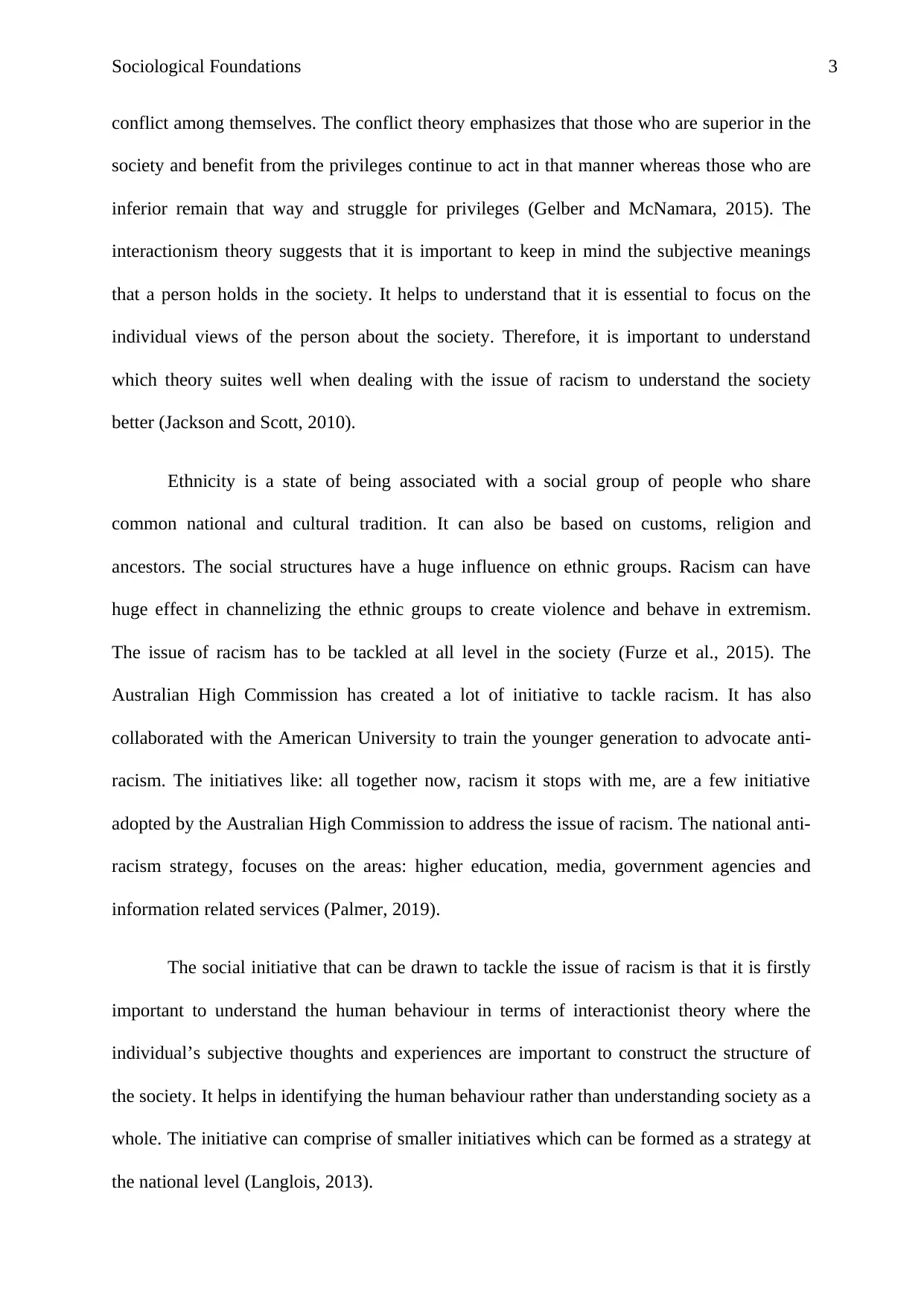
Sociological Foundations 3
conflict among themselves. The conflict theory emphasizes that those who are superior in the
society and benefit from the privileges continue to act in that manner whereas those who are
inferior remain that way and struggle for privileges (Gelber and McNamara, 2015). The
interactionism theory suggests that it is important to keep in mind the subjective meanings
that a person holds in the society. It helps to understand that it is essential to focus on the
individual views of the person about the society. Therefore, it is important to understand
which theory suites well when dealing with the issue of racism to understand the society
better (Jackson and Scott, 2010).
Ethnicity is a state of being associated with a social group of people who share
common national and cultural tradition. It can also be based on customs, religion and
ancestors. The social structures have a huge influence on ethnic groups. Racism can have
huge effect in channelizing the ethnic groups to create violence and behave in extremism.
The issue of racism has to be tackled at all level in the society (Furze et al., 2015). The
Australian High Commission has created a lot of initiative to tackle racism. It has also
collaborated with the American University to train the younger generation to advocate anti-
racism. The initiatives like: all together now, racism it stops with me, are a few initiative
adopted by the Australian High Commission to address the issue of racism. The national anti-
racism strategy, focuses on the areas: higher education, media, government agencies and
information related services (Palmer, 2019).
The social initiative that can be drawn to tackle the issue of racism is that it is firstly
important to understand the human behaviour in terms of interactionist theory where the
individual’s subjective thoughts and experiences are important to construct the structure of
the society. It helps in identifying the human behaviour rather than understanding society as a
whole. The initiative can comprise of smaller initiatives which can be formed as a strategy at
the national level (Langlois, 2013).
conflict among themselves. The conflict theory emphasizes that those who are superior in the
society and benefit from the privileges continue to act in that manner whereas those who are
inferior remain that way and struggle for privileges (Gelber and McNamara, 2015). The
interactionism theory suggests that it is important to keep in mind the subjective meanings
that a person holds in the society. It helps to understand that it is essential to focus on the
individual views of the person about the society. Therefore, it is important to understand
which theory suites well when dealing with the issue of racism to understand the society
better (Jackson and Scott, 2010).
Ethnicity is a state of being associated with a social group of people who share
common national and cultural tradition. It can also be based on customs, religion and
ancestors. The social structures have a huge influence on ethnic groups. Racism can have
huge effect in channelizing the ethnic groups to create violence and behave in extremism.
The issue of racism has to be tackled at all level in the society (Furze et al., 2015). The
Australian High Commission has created a lot of initiative to tackle racism. It has also
collaborated with the American University to train the younger generation to advocate anti-
racism. The initiatives like: all together now, racism it stops with me, are a few initiative
adopted by the Australian High Commission to address the issue of racism. The national anti-
racism strategy, focuses on the areas: higher education, media, government agencies and
information related services (Palmer, 2019).
The social initiative that can be drawn to tackle the issue of racism is that it is firstly
important to understand the human behaviour in terms of interactionist theory where the
individual’s subjective thoughts and experiences are important to construct the structure of
the society. It helps in identifying the human behaviour rather than understanding society as a
whole. The initiative can comprise of smaller initiatives which can be formed as a strategy at
the national level (Langlois, 2013).
Paraphrase This Document
Need a fresh take? Get an instant paraphrase of this document with our AI Paraphraser
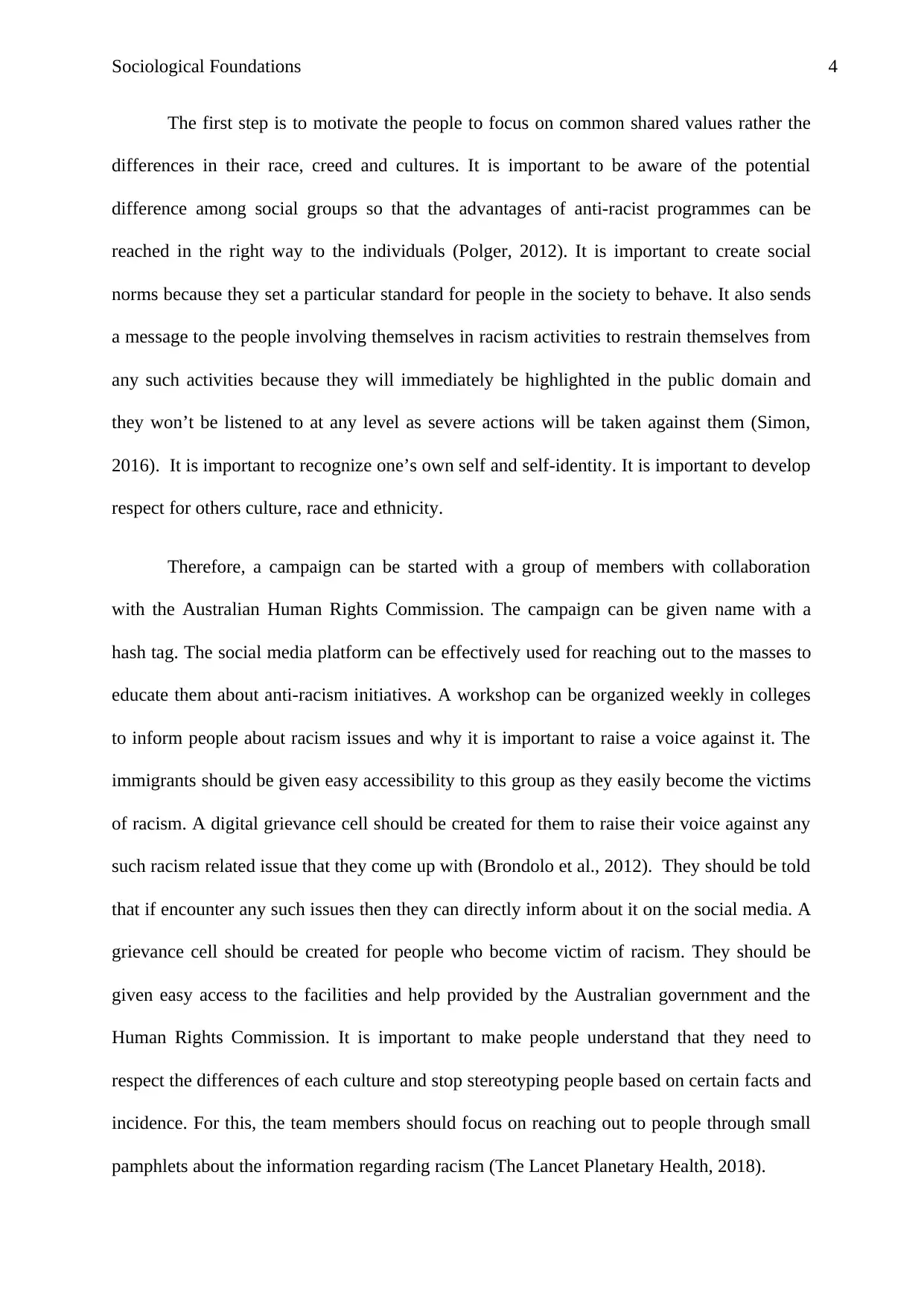
Sociological Foundations 4
The first step is to motivate the people to focus on common shared values rather the
differences in their race, creed and cultures. It is important to be aware of the potential
difference among social groups so that the advantages of anti-racist programmes can be
reached in the right way to the individuals (Polger, 2012). It is important to create social
norms because they set a particular standard for people in the society to behave. It also sends
a message to the people involving themselves in racism activities to restrain themselves from
any such activities because they will immediately be highlighted in the public domain and
they won’t be listened to at any level as severe actions will be taken against them (Simon,
2016). It is important to recognize one’s own self and self-identity. It is important to develop
respect for others culture, race and ethnicity.
Therefore, a campaign can be started with a group of members with collaboration
with the Australian Human Rights Commission. The campaign can be given name with a
hash tag. The social media platform can be effectively used for reaching out to the masses to
educate them about anti-racism initiatives. A workshop can be organized weekly in colleges
to inform people about racism issues and why it is important to raise a voice against it. The
immigrants should be given easy accessibility to this group as they easily become the victims
of racism. A digital grievance cell should be created for them to raise their voice against any
such racism related issue that they come up with (Brondolo et al., 2012). They should be told
that if encounter any such issues then they can directly inform about it on the social media. A
grievance cell should be created for people who become victim of racism. They should be
given easy access to the facilities and help provided by the Australian government and the
Human Rights Commission. It is important to make people understand that they need to
respect the differences of each culture and stop stereotyping people based on certain facts and
incidence. For this, the team members should focus on reaching out to people through small
pamphlets about the information regarding racism (The Lancet Planetary Health, 2018).
The first step is to motivate the people to focus on common shared values rather the
differences in their race, creed and cultures. It is important to be aware of the potential
difference among social groups so that the advantages of anti-racist programmes can be
reached in the right way to the individuals (Polger, 2012). It is important to create social
norms because they set a particular standard for people in the society to behave. It also sends
a message to the people involving themselves in racism activities to restrain themselves from
any such activities because they will immediately be highlighted in the public domain and
they won’t be listened to at any level as severe actions will be taken against them (Simon,
2016). It is important to recognize one’s own self and self-identity. It is important to develop
respect for others culture, race and ethnicity.
Therefore, a campaign can be started with a group of members with collaboration
with the Australian Human Rights Commission. The campaign can be given name with a
hash tag. The social media platform can be effectively used for reaching out to the masses to
educate them about anti-racism initiatives. A workshop can be organized weekly in colleges
to inform people about racism issues and why it is important to raise a voice against it. The
immigrants should be given easy accessibility to this group as they easily become the victims
of racism. A digital grievance cell should be created for them to raise their voice against any
such racism related issue that they come up with (Brondolo et al., 2012). They should be told
that if encounter any such issues then they can directly inform about it on the social media. A
grievance cell should be created for people who become victim of racism. They should be
given easy access to the facilities and help provided by the Australian government and the
Human Rights Commission. It is important to make people understand that they need to
respect the differences of each culture and stop stereotyping people based on certain facts and
incidence. For this, the team members should focus on reaching out to people through small
pamphlets about the information regarding racism (The Lancet Planetary Health, 2018).
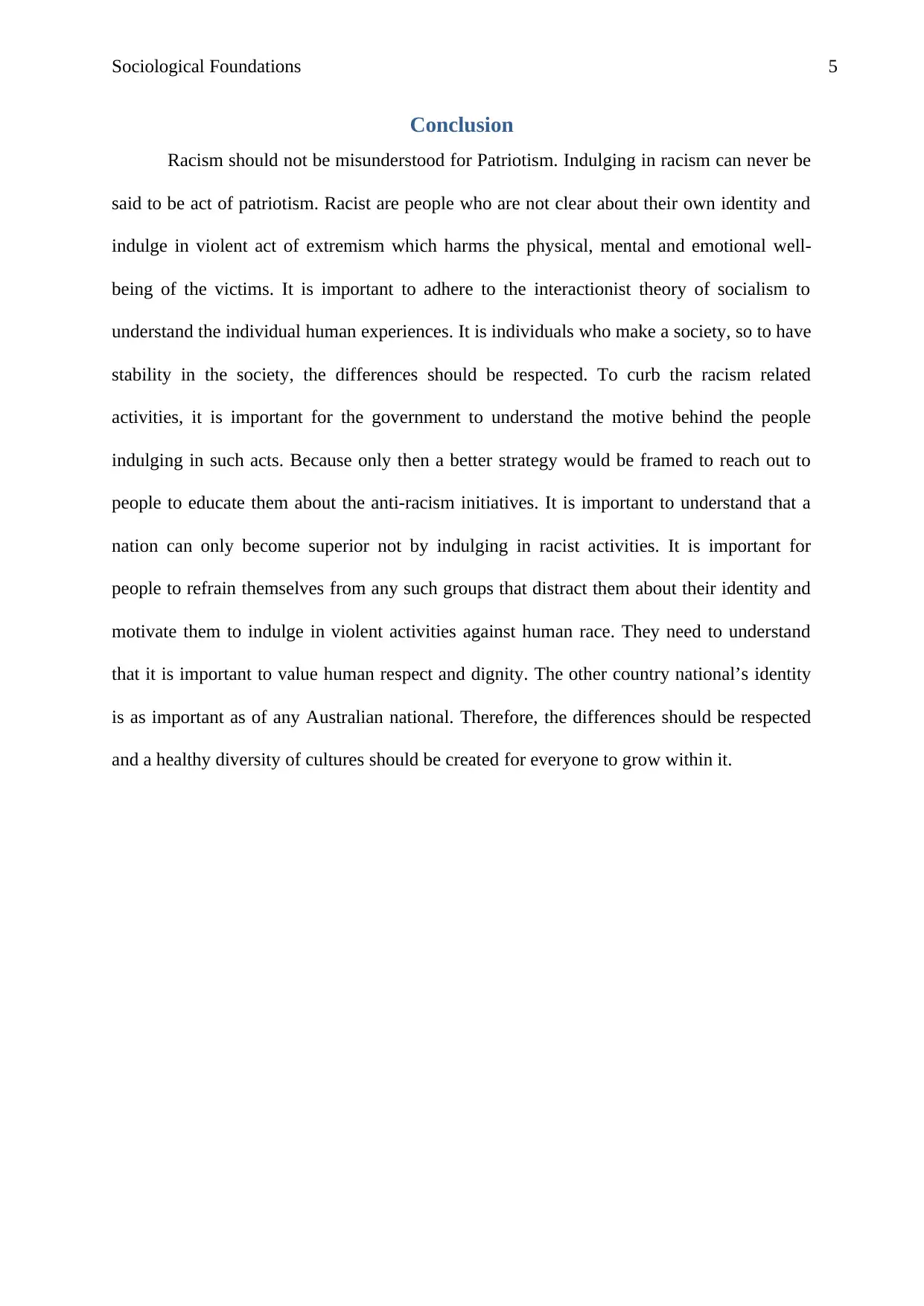
Sociological Foundations 5
Conclusion
Racism should not be misunderstood for Patriotism. Indulging in racism can never be
said to be act of patriotism. Racist are people who are not clear about their own identity and
indulge in violent act of extremism which harms the physical, mental and emotional well-
being of the victims. It is important to adhere to the interactionist theory of socialism to
understand the individual human experiences. It is individuals who make a society, so to have
stability in the society, the differences should be respected. To curb the racism related
activities, it is important for the government to understand the motive behind the people
indulging in such acts. Because only then a better strategy would be framed to reach out to
people to educate them about the anti-racism initiatives. It is important to understand that a
nation can only become superior not by indulging in racist activities. It is important for
people to refrain themselves from any such groups that distract them about their identity and
motivate them to indulge in violent activities against human race. They need to understand
that it is important to value human respect and dignity. The other country national’s identity
is as important as of any Australian national. Therefore, the differences should be respected
and a healthy diversity of cultures should be created for everyone to grow within it.
Conclusion
Racism should not be misunderstood for Patriotism. Indulging in racism can never be
said to be act of patriotism. Racist are people who are not clear about their own identity and
indulge in violent act of extremism which harms the physical, mental and emotional well-
being of the victims. It is important to adhere to the interactionist theory of socialism to
understand the individual human experiences. It is individuals who make a society, so to have
stability in the society, the differences should be respected. To curb the racism related
activities, it is important for the government to understand the motive behind the people
indulging in such acts. Because only then a better strategy would be framed to reach out to
people to educate them about the anti-racism initiatives. It is important to understand that a
nation can only become superior not by indulging in racist activities. It is important for
people to refrain themselves from any such groups that distract them about their identity and
motivate them to indulge in violent activities against human race. They need to understand
that it is important to value human respect and dignity. The other country national’s identity
is as important as of any Australian national. Therefore, the differences should be respected
and a healthy diversity of cultures should be created for everyone to grow within it.
⊘ This is a preview!⊘
Do you want full access?
Subscribe today to unlock all pages.

Trusted by 1+ million students worldwide
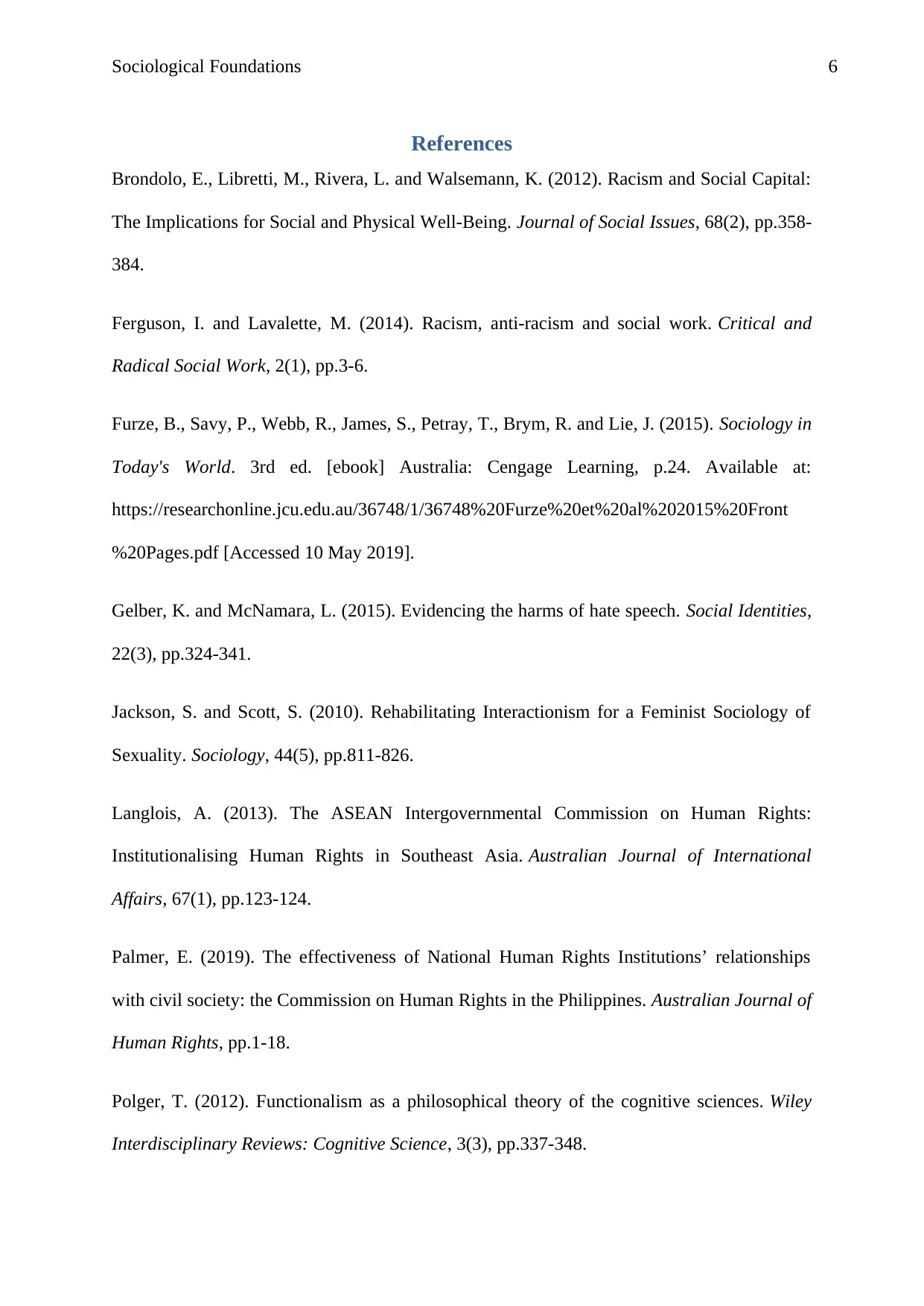
Sociological Foundations 6
References
Brondolo, E., Libretti, M., Rivera, L. and Walsemann, K. (2012). Racism and Social Capital:
The Implications for Social and Physical Well-Being. Journal of Social Issues, 68(2), pp.358-
384.
Ferguson, I. and Lavalette, M. (2014). Racism, anti-racism and social work. Critical and
Radical Social Work, 2(1), pp.3-6.
Furze, B., Savy, P., Webb, R., James, S., Petray, T., Brym, R. and Lie, J. (2015). Sociology in
Today's World. 3rd ed. [ebook] Australia: Cengage Learning, p.24. Available at:
https://researchonline.jcu.edu.au/36748/1/36748%20Furze%20et%20al%202015%20Front
%20Pages.pdf [Accessed 10 May 2019].
Gelber, K. and McNamara, L. (2015). Evidencing the harms of hate speech. Social Identities,
22(3), pp.324-341.
Jackson, S. and Scott, S. (2010). Rehabilitating Interactionism for a Feminist Sociology of
Sexuality. Sociology, 44(5), pp.811-826.
Langlois, A. (2013). The ASEAN Intergovernmental Commission on Human Rights:
Institutionalising Human Rights in Southeast Asia. Australian Journal of International
Affairs, 67(1), pp.123-124.
Palmer, E. (2019). The effectiveness of National Human Rights Institutions’ relationships
with civil society: the Commission on Human Rights in the Philippines. Australian Journal of
Human Rights, pp.1-18.
Polger, T. (2012). Functionalism as a philosophical theory of the cognitive sciences. Wiley
Interdisciplinary Reviews: Cognitive Science, 3(3), pp.337-348.
References
Brondolo, E., Libretti, M., Rivera, L. and Walsemann, K. (2012). Racism and Social Capital:
The Implications for Social and Physical Well-Being. Journal of Social Issues, 68(2), pp.358-
384.
Ferguson, I. and Lavalette, M. (2014). Racism, anti-racism and social work. Critical and
Radical Social Work, 2(1), pp.3-6.
Furze, B., Savy, P., Webb, R., James, S., Petray, T., Brym, R. and Lie, J. (2015). Sociology in
Today's World. 3rd ed. [ebook] Australia: Cengage Learning, p.24. Available at:
https://researchonline.jcu.edu.au/36748/1/36748%20Furze%20et%20al%202015%20Front
%20Pages.pdf [Accessed 10 May 2019].
Gelber, K. and McNamara, L. (2015). Evidencing the harms of hate speech. Social Identities,
22(3), pp.324-341.
Jackson, S. and Scott, S. (2010). Rehabilitating Interactionism for a Feminist Sociology of
Sexuality. Sociology, 44(5), pp.811-826.
Langlois, A. (2013). The ASEAN Intergovernmental Commission on Human Rights:
Institutionalising Human Rights in Southeast Asia. Australian Journal of International
Affairs, 67(1), pp.123-124.
Palmer, E. (2019). The effectiveness of National Human Rights Institutions’ relationships
with civil society: the Commission on Human Rights in the Philippines. Australian Journal of
Human Rights, pp.1-18.
Polger, T. (2012). Functionalism as a philosophical theory of the cognitive sciences. Wiley
Interdisciplinary Reviews: Cognitive Science, 3(3), pp.337-348.
Paraphrase This Document
Need a fresh take? Get an instant paraphrase of this document with our AI Paraphraser
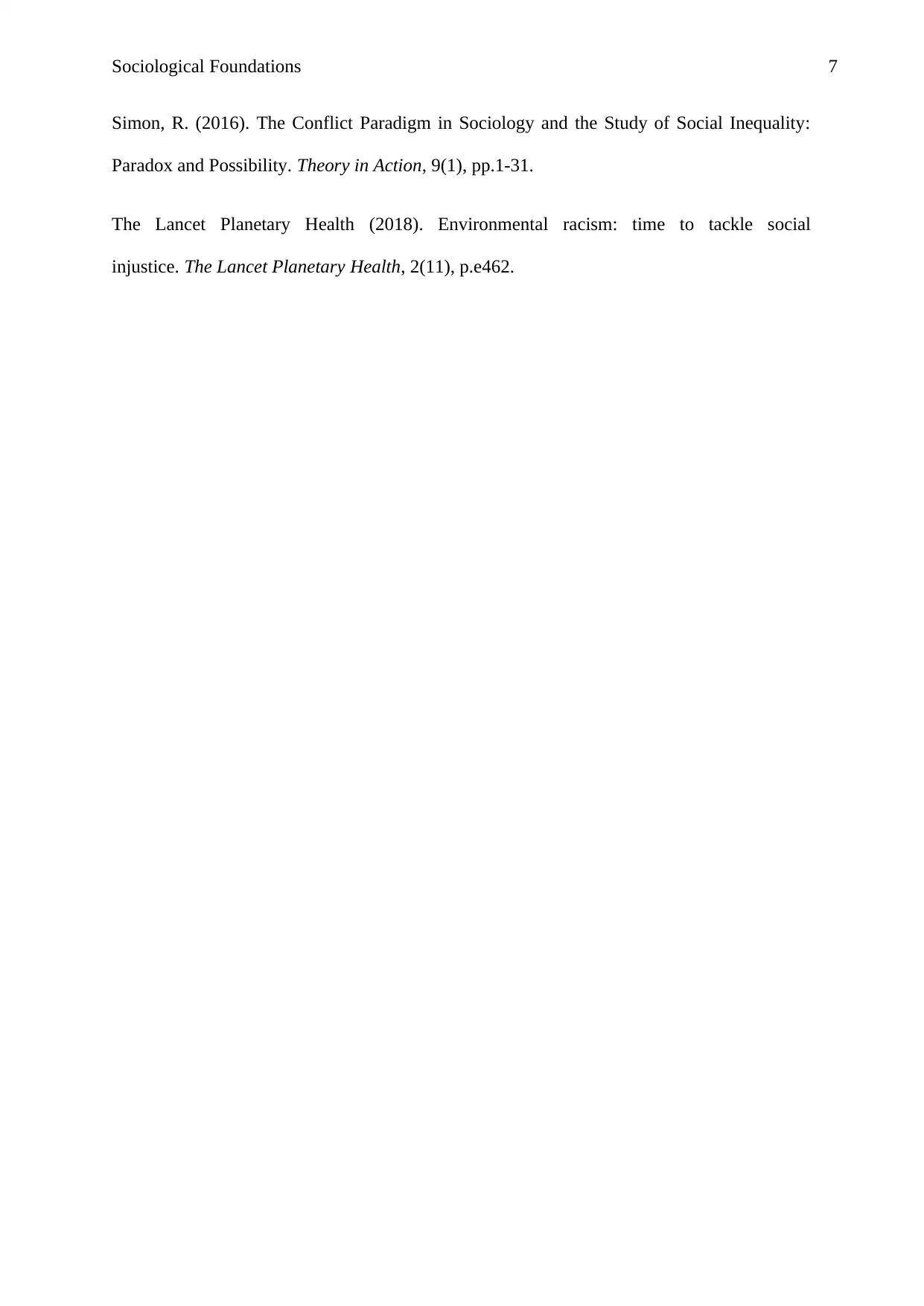
Sociological Foundations 7
Simon, R. (2016). The Conflict Paradigm in Sociology and the Study of Social Inequality:
Paradox and Possibility. Theory in Action, 9(1), pp.1-31.
The Lancet Planetary Health (2018). Environmental racism: time to tackle social
injustice. The Lancet Planetary Health, 2(11), p.e462.
Simon, R. (2016). The Conflict Paradigm in Sociology and the Study of Social Inequality:
Paradox and Possibility. Theory in Action, 9(1), pp.1-31.
The Lancet Planetary Health (2018). Environmental racism: time to tackle social
injustice. The Lancet Planetary Health, 2(11), p.e462.
1 out of 8
Related Documents
Your All-in-One AI-Powered Toolkit for Academic Success.
+13062052269
info@desklib.com
Available 24*7 on WhatsApp / Email
![[object Object]](/_next/static/media/star-bottom.7253800d.svg)
Unlock your academic potential
Copyright © 2020–2026 A2Z Services. All Rights Reserved. Developed and managed by ZUCOL.





